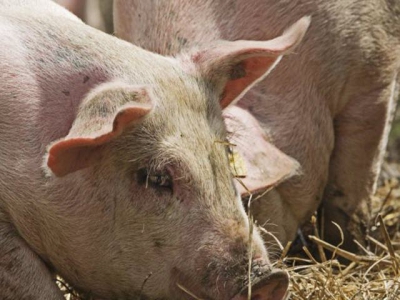Model predicts vaccine effectiveness in animals

Developed for porcine reproductive and respiratory syndrome, new epidemiological model predicts effectiveness of vaccines at preventing or eliminating infectious diseases in livestock.
Researchers at The Roslin Institute in Scotland have developed a new epidemiological model to investigate the effectiveness of vaccines for preventing, mitigating or eliminating infectious diseases in livestock. According to the institute's announcement, the model shows that when appropriately applied, even imperfect vaccines can prevent, eliminate or largely reduce the prevalence of viruses.
The study has practical implications for the design of vaccines and vaccination programs in livestock, Roslin added.
The goal of effective vaccination is not only to protect individuals from disease but to decrease the risk and severity of disease outbreaks and, ultimately, eradicate the disease, the researchers said.
The model shows that combining diverse vaccine properties may have a multiplicative effect and, thus, be considerably more effective, according to the institute. This could be used to prevent outbreaks if the vaccine is applied as a preventive measure or to eliminate disease spread if applied during outbreaks.
PRRS example
According to the announcement, the model was used to investigate the effectiveness of vaccines to combat porcine reproductive and respiratory syndrome (PRRS) virus, although many of the principles apply to other viruses and pathogens.
The PRRS virus causes breathing problems and deaths in young animals and is endemic in most pig-producing countries worldwide. Vaccines have mostly failed to stop the spread of the virus, Roslin said.
The new model shows that the control or even elimination of PRRS through vaccination may well be within reach, as long as the vaccine sufficiently speeds up recovery and reduces virus replication, the announcement said.
“Veterinary vaccines often only confer limited immunity and, thus, may not prevent infection. In this study, we developed a model that combines epidemiological consequences of different vaccination strategies and different vaccine properties applied to livestock. The model is successful in predicting the effectiveness of vaccines in livestock,” said Roslin professor Andrea Wilson, personal chair in animal disease genetics and modeling.
The Roslin researchers have developed a wiki-website meant to provide scientists, veterinarians and the public with insight into the diverse factors influencing vaccine effectiveness in livestock as part of the European research project "Strengthening Animal Production & Health through Immune Response."
The wiki contains a user-friendly interactive modeling app that illustrates how different types of vaccine and vaccination strategies may together influence how diseases spread, the announcement explained.
Related news
 Yeast supplement may support gut health for disease-challenged piglets
Yeast supplement may support gut health for disease-challenged piglets A yeast-based supplement may improve gut health and support piglet growth and weight gain following a disease challenge and weaning, researchers say.
 Spanish trial shows potential for protected benzoic acid in zero zinc oxide diets
Spanish trial shows potential for protected benzoic acid in zero zinc oxide diets Piglets fed diets containing the protected organic acid product showed higher average daily gain (ADG) and lower feed conversion ratio (FCR)
 PRRSV study compares strain virulence
PRRSV study compares strain virulence High-virulence strain caused earlier and greater damage than low-virulence strain and also can attack lymphatic system and bone marrow.